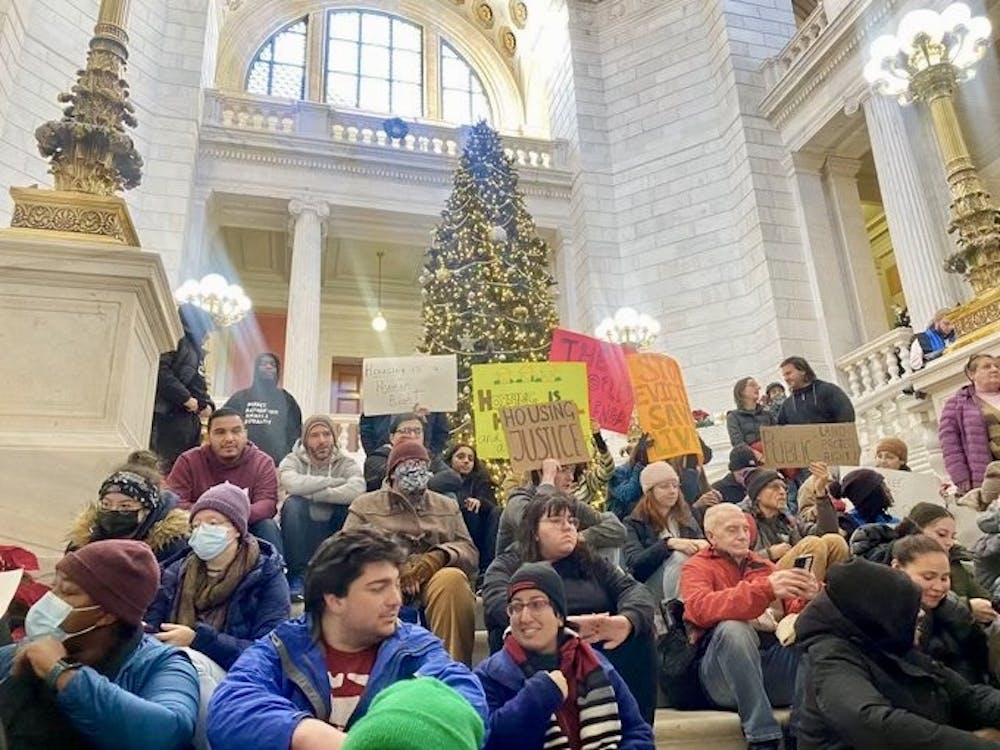Every weekday in the early evening, groups of four to five Brown students depart from College Hill carrying backpacks of food, water, hygiene materials, donated clothing and Narcan.
On these outreach routes — which cover Providence’s South Side and downtown, as well as Pawtucket and Cranston — students aim to “build connections” with unhoused community members while addressing their basic needs, said Austin Courtney ’26, a student on one of the outreach teams.
These trips are one of many efforts undertaken by Housing Opportunities for People Everywhere, a student-led organization supported by the Swearer Center.
Founded in 2004, HOPE’s roots are based in direct outreach to unhoused populations. But the organization also focuses on advocacy efforts and helping individuals experiencing housing insecurity navigate the state’s bureaucratic systems, three club members told The Herald.
Gabriela Paz-Soldán ’24, who leads HOPE’s advocacy branch, said that the organization is centered around “the idea that housing is a human right and that everyone should have access to housing that is safe and affordable.
HOPE’s advocacy wing mobilizes club members and the broader Brown community around housing justice issues in Providence, including income discrimination in rental applications, tenants’ rights and the right to counsel, Paz-Soldán said.
Rhode Island is currently facing a housing crisis, with the state’s per capita homelessness rate ranking 17th highest in the country, The Herald previously reported. The state’s housing production rate per 1,000 residents was the lowest in the nation in 2021, and 150,000 households within the state are cost-burdened.
In recent years, HOPE has collaborated on community-based research, organized clothing drives, led groups to participate in housing-related protests and given testimonies before the state legislature.
Much of HOPE’s advocacy work occurs in collaboration with local organizations, including the Rhode Island Homeless Advocacy Project, Direct Action for Rights and Equality, Reclaim Rhode Island and HousingWorks R.I.
“HOPE’s work aligns well with the Swearer Center’s mission of centering community input in engagement,” wrote Sophia Pray, manager of community-engaged learning at the center. “Their long-standing presence in the broader Providence community has made them a reliable source of support.”
The third branch of HOPE is a documents-gathering project, a bi-weekly clinic supporting “people across the homeless spectrum” in obtaining documents such as birth certificates, state IDs and RIPTA disability bus passes, wrote Lily Gardner ’26, co-leader of the project, in an email to The Herald. The clinic operates on Sunday mornings out of Mathewson Street United Methodist Church in downtown Providence, Gardner wrote.
These documents are “essential for daily life and are also the foundation for an affordable housing application,” Gardner wrote. The RIPTA disability bus pass can assist unhoused Rhode Islanders in accessing “resources available to houseless folks, such as free meals in Rhode Island, as well as (to) do daily activities (and) seek medical care.”
“This team was a core way that I could help provide essential services, build deep relationships in the broader Providence community and continue to fight for a vision of a just future,” Gardner wrote.
Elisa Dong ’24, a coordinator for the project, noted the importance of the clinic in serving the unhoused population by addressing “both long- and short-term goals in helping people get housing.”
After their weekly trips, each outreach team debriefs on their exchanges with community members and any emotions or thoughts that they evoked, Courtney said. By reflecting on these interactions, the members are “interrogating their intentions and working to better understand their impacts from all angles,” Pray wrote.
“HOPE has helped me reflect a lot on what it means to be a member of a community, and what it means to show true care,” Dong wrote.
Paz-Soldán said that participating in a values-driven organization has inspired her to pursue a career oriented around social justice. Despite the challenges of the work, she hopes to keep working in community-centered organizing.
“There's always kind of small moments of hope that come through in this work,” she said.





